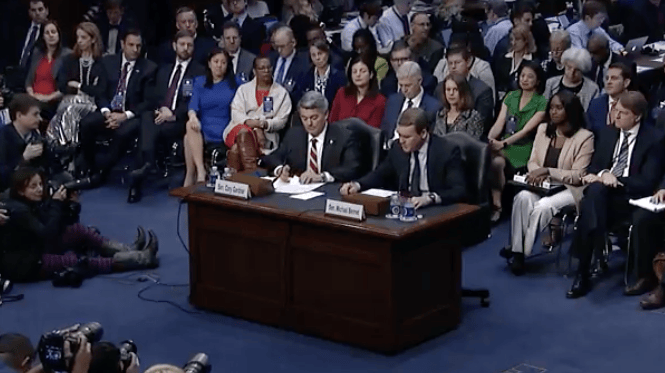
Mary Clare Jalonick, Associated Press
Republican and Democratic senators exchanged bitter accusations Tuesday as they headed toward an explosive confrontation over President Donald Trump's Supreme Court nominee that could change the Senate, and the court, for generations.
"It should be unsettling to everyone that our colleagues across the aisle have brought the Senate to this new low," Majority Leader Mitch McConnell, R-Ky., complained as he announced plans to shut off debate on Judge Neil Gorsuch's nomination and move to a final vote.
Minority Democrats command more than enough votes to mount a filibuster blocking McConnell's move. But rather than let the Democratic obstruction stand, McConnell and Republicans plan to enact a unilateral rules change to eliminate the filibuster for Supreme Court nominees. It would lower the vote threshold from the current 60 to a simple majority in the 100-member Senate.
The change is known as the "nuclear option," and senators of both parties lament it will further erode the Senate's bipartisan traditions and contribute to the political polarization besetting the nation. Yet in a sign of how deep that polarization runs, most senators have made little effort to come up with a compromise to head off the showdown.
Instead, the parties spent much of Tuesday trading blame. Republicans pointed out that filibusters of Supreme Court nominees have been almost unheard of, while Democrats complained that Republicans will have only themselves to blame if they go forward with the rules change. Democrats cite the treatment last year of Judge Merrick Garland, President Barack Obama's Supreme Court nominee, who was blocked by Republicans after the death of Justice Antonin Scalia in February 2016.
Scalia's seat has remained open for 14 months, allowing Trump to nominate Gorsuch, a conservative in the mold of Scalia who has served for more than a decade on the 10th U.S. Circuit Court of Appeals in Denver.
"I cannot believe he can stand here on the floor of the United States Senate and with a straight face say that Democrats are launching the first partisan filibuster of a Supreme Court nominee," Senate Minority Leader Chuck Schumer, D-N.Y., said after McConnell spoke. "What the majority leader did to Merrick Garland by denying him even a hearing and a vote is even worse than a filibuster."
Gorsuch, 49, cleared the Judiciary Committee on a party line 11-9 vote on Monday, and the nuclear option showdown is expected on Thursday. Final confirmation of Gorsuch would come on Friday, allowing him to join the court in time to hear the final set of cases in its current term.
Gorsuch now counts 55 supporters in the Senate: the 52 Republicans, along with three moderate Democrats from states Trump won last November — Joe Manchin of West Virginia, Heidi Heitkamp of North Dakota and Joe Donnelly of Indiana. A fourth Senate Democrat, Michael Bennet from Gorsuch's home state of Colorado, has said he will not join in the filibuster against Gorsuch but has not said how he will vote on final passage.
The long-term consequences of the coming confrontation could be profound, as the rules change Republicans intend to enact would apply to future Supreme Court nominees as well, allowing them to be voted onto the court without any input from the minority party. Though predicting a justice's votes can be difficult, Gorsuch's confirmation is expected to restore the conservative majority that existed while Scalia was alive, and which could persist for years or even grow.
For Republicans and Trump, Gorsuch's confirmation would be a moment of triumph, a bright spot in a troubled young administration that's failed on the legislative front with the health care bill and is under investigation over Russia connections.













